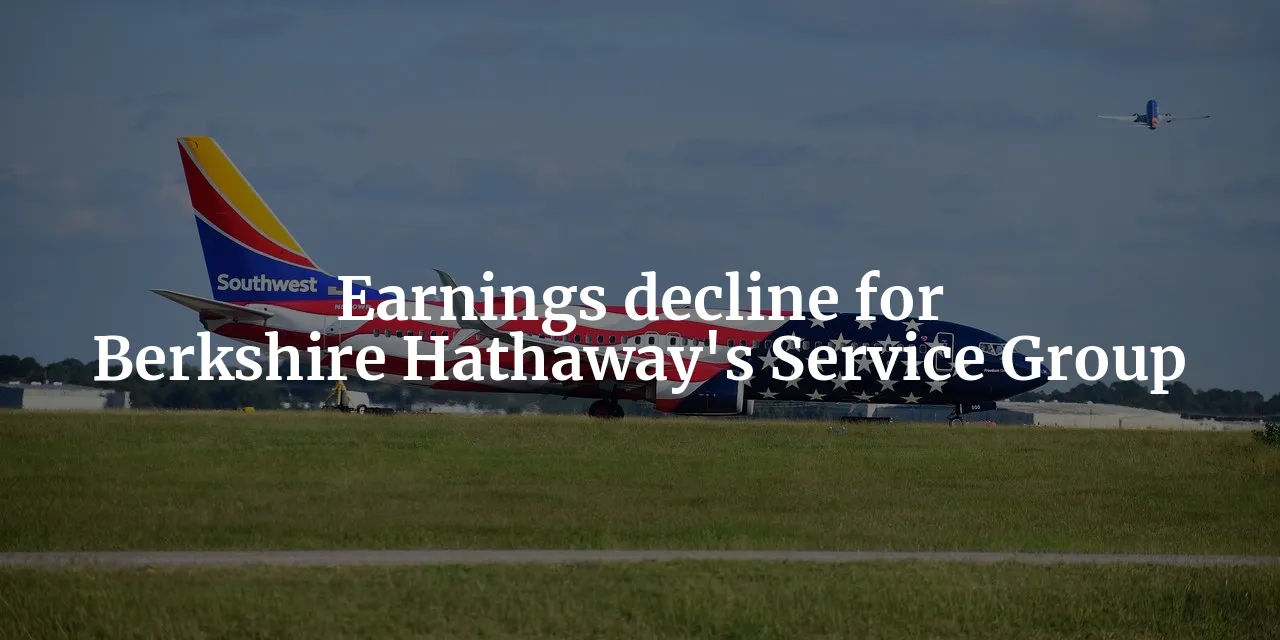Tags: Earnings / Netjets / FlightSafety / TTI
This fanpage is not officially affiliated with Berkshire Hathaway: Disclaimer
Berkshire Hathaway's Service Group, which includes companies like NetJets and FlightSafety International, experienced a slight decline in earnings in Q3 2023. This article delves into the factors that contributed to this decline, including challenges faced by NetJets and FlightSafety, as well as contrasting trends in aviation services and electronic component distribution. Despite the dip, shareholders can take comfort in Berkshire Hathaway's track record of navigating turbulence and its long-term vision for growth and stability. The article emphasizes the resilience and adaptability of these companies and encourages shareholders to remain optimistic in the face of uncertainty.

Introduction
Berkshire Hathaway, a conglomerate holding company led by the venerable investor Warren Buffett, has long been a symbol of stability and growth in the ever-fluctuating world of finance ↗. With a diverse portfolio that spans across various sectors, Berkshire Hathaway's subsidiaries have been pivotal in shaping the conglomerate's success story ↗. However, even the most robust of empires face challenges, and for Berkshire Hathaway's Service Group, the third quarter of 2023 brought about some turbulence that warrants a closer examination.
The importance of analyzing the Q3 2023 earnings decline in the Service Group cannot be overstated. For shareholders, understanding the intricacies behind these financial figures is crucial in assessing the health of their investments and the future trajectory of the company. This article aims to provide a comprehensive dissection of the factors that led to the slight decline in earnings, particularly focusing on NetJets, FlightSafety International, and other key players within the group.
As we navigate through this analysis, we will explore the historical context of these subsidiaries, their contributions to Berkshire Hathaway's overall performance, and the economic and political landscapes that have influenced their operations. By doing so, shareholders can gain a nuanced perspective on the current state of affairs and the strategic moves that may be on the horizon.
The Service Group: Unveiling the Key Players
Within the vast expanse of Berkshire Hathaway's operations, the Service Group stands out for its specialized offerings that cater to a niche market. This group encompasses a range of companies, each with its unique value proposition and market presence. At the forefront of this group are two notable entities: NetJets and FlightSafety International.
NetJets has been a trailblazer in the realm of fractional ownership of private business jets, a concept that revolutionized the aviation industry by making private jet travel more accessible to a broader audience. Since its inception, NetJets has grown to become the world's largest private jet operator, a testament to its innovative business model and commitment to excellence.
FlightSafety International, on the other hand, has carved out a reputation as the world's premier professional aviation training company. With an extensive fleet of advanced full-flight simulators and a global footprint, FlightSafety International has been instrumental in ensuring the highest standards of safety and proficiency among aviation professionals.
Despite the stellar reputations and robust business models of these companies, the Service Group experienced a decline in pre-tax earnings by $34 million (4.2%) in Q3 2023 compared to the previous year. This decline, juxtaposed against an increase in service group revenues by $329 million (6.9%), presents a paradox that requires a deeper dive into the operational dynamics of the group.
NetJets: A Fractional Ownership Pioneer
The story of NetJets is one of innovation and foresight. Founded as Executive Jet Airways in 1964, it underwent a transformation into Executive Jet Aviation before launching its fractional ownership business in 1986. This move not only disrupted the market but also democratized luxury aviation, allowing individuals and companies to own a share of a private jet without the full costs and responsibilities of sole ownership.
The benefits of fractional ownership are manifold. Clients gain guaranteed access to a chosen aircraft with as little as four hours' notice, pay monthly maintenance fees for a minimum of 50 annual flight hours, and a five-year commitment, as well as operating fees by the hour for aircraft use. This flexibility and cost-efficiency have made NetJets the go-to for those seeking the perks of private flight without the traditional barriers.
However, the Q3 2023 earnings decline has cast a shadow over NetJets' otherwise sunny outlook. Despite an 8.3% increase in aviation services revenue, the company, along with others in the Service Group, has faced challenges that have impacted its financial performance. Understanding these challenges is crucial for stakeholders looking to grasp the nuances of the current situation.
FlightSafety International: Elevating Aviation Training
FlightSafety International's role within the Service Group and the aviation industry at large cannot be overstated. As the provider of professional aviation training, the company has been pivotal in upholding the safety and efficiency standards that are the backbone of the aviation sector. With the expansion of its PC-24 training capacity in Europe, FlightSafety International is poised to further cement its position as a leader in aviation education.
This expansion, which includes the deployment of a fourth full-flight simulator for the Pilatus PC-24 Super Versatile Jet at the Paris Le Bourget Learning Center, signals FlightSafety International's commitment to meeting the growing demand for specialized training ↗. The PC-24's unique capability to operate on short unprepared runways opens up new possibilities for business aviation, and FlightSafety is at the forefront of training pilots to harness this potential.
Despite these advancements, the Q3 2023 earnings decline has raised questions about the immediate future. With over 1,000 PC-24 pilots trained since 2013, the company's expertise is undisputed, but the financial dip suggests that even the most esteemed institutions are not immune to market fluctuations and economic pressures.
The Q3 2023 Earnings Decline: Unraveling the Factors
To comprehend the Service Group's earnings decline, one must first acknowledge the revenue increase in aviation services, which rose by 8.3% in Q3 2023 compared to the previous year. This growth indicates a healthy demand for aviation services, a sector buoyed by the gradual recovery of global travel and commerce following the challenges of the pandemic era.
Conversely, the revenue from TTI, a component of the Service Group known for its specialization in electronic component distribution, experienced a 7.2% decline in the same quarter. This drop, coupled with a year-to-date earnings decline of 10.3%, points to underlying issues that may include supply chain disruptions, geopolitical tensions affecting trade, or shifts in technology demands.
The pre-tax earnings decline in the Service Group is a reflection of these contrasting trends. While the aviation services revenue growth is a positive sign, it has not been sufficient to offset the challenges faced by TTI and others within the group. This nuanced scenario underscores the complexity of the current economic environment and the need for strategic adaptation.
NetJets' Fleet: A Glimpse into Luxury Aviation
NetJets' fleet is a showcase of luxury and diversity, featuring aircraft types ranging from the Embraer Phenom 300 to the Bombardier Global 7500. With a total of 604 aircraft, NetJets offers an unparalleled selection to its fractional owners, ensuring that each client's needs are met with precision and care.
The global reach and services provided by NetJets are unmatched, with the fleet flying 478,444 hours in 2021 alone. This level of operation speaks to the company's dominance in the market and its ability to cater to the high demands of luxury travel. However, the Q3 2023 earnings decline may prompt a reassessment of fleet utilization and cost management to maintain profitability while delivering the exceptional service that NetJets is known for.
FlightSafety International's Partnership with Pilatus
The partnership between FlightSafety International and Pilatus is a strategic alliance that leverages the strengths of both companies. Pilatus, with its innovative aircraft like the PC-24 and a workforce of over 2,500 employees, finds a perfect training partner in FlightSafety, which boasts the largest fleet of advanced full-flight simulators in the world.
The significance of the PC-24 program cannot be overstated, as it represents a leap forward in business jet capabilities. FlightSafety's role in training pilots for this cutting-edge aircraft is vital for ensuring that the PC-24's potential is fully realized in the hands of skilled aviators.
The Q3 2023 earnings decline may have implications for this partnership, particularly in terms of investment in new training technologies and resources. However, the long-term nature of such collaborations suggests that both FlightSafety and Pilatus are well-positioned to navigate these temporary headwinds.
FlightSafety International's Training Excellence
FlightSafety International's reputation as a premier aviation training company is built on a foundation of excellence and a commitment to safety. The company's extensive training programs serve a wide range of aviation professionals, from pilots to technicians, ensuring that the industry's stringent standards are met consistently.
The Q3 2023 earnings decline may have an impact on FlightSafety's operations, potentially affecting the pace of expansion or investment in new training initiatives. However, the company's established track record and the critical nature of its services suggest that it will continue to play a pivotal role in the aviation industry.
Conclusion: Navigating the Skies for Shareholders of Berkshire Hathaway
The Q3 2023 earnings decline in Berkshire Hathaway's Service Group, particularly affecting NetJets and FlightSafety International, presents a complex picture for shareholders. While there are certainly challenges to be addressed, the underlying strength of these companies and their contributions to the conglomerate's portfolio cannot be ignored.
The future prospects and strategies for NetJets, FlightSafety, and other companies within the Service Group will likely involve a combination of cost optimization, strategic investments, and a continued focus on innovation. Shareholders can take comfort in Berkshire Hathaway's proven track record of navigating market turbulence and its long-term vision for growth and stability.
In times of uncertainty, it is the resilience and adaptability of companies like NetJets and FlightSafety International that will determine their trajectory. For shareholders of Berkshire Hathaway, remaining optimistic and trusting in the conglomerate's strategic acumen is essential as they continue to navigate the skies of the global economy.
References
- www.berkshirehathaway.com: Third Quarter 2023
- en.wikipedia.org: NetJets - Wikipedia
- news.flightsafety.com: FlightSafety International Expands PC-24 Training Capacity in Europe - FlightSafety International Media Center











